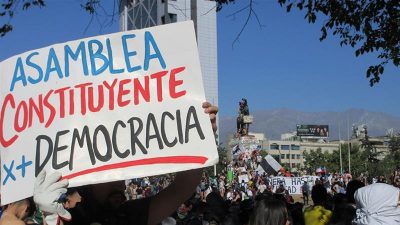Chilean Government Agrees with New Constitution, but Vetoes New Constituent Assembly

Chile has been experiencing violent popular protests for over a year. The general dissatisfaction with the government of Sebastián Piñera and his allies has generated strong unrest in the country, which has worried the Chilean political elite. In this sense, fear of the consequences of the rebellions has led government officials to propose an agreement to stop the violence, but, apparently, the proposal is intended only to serve the interests of the government itself.
The Agreement for Social Peace and the New Constitution was then signed, celebrated between the political parties allied with the government and a large part of the opposition. This agreement provides for a plebiscite – scheduled for October 25th – in which Chileans must define whether they want a new Constitution and whether it should be elaborated by means of a Mixed Convention or a Constitutional Convention. These conditions are generating rejection in several social, political and territorial organizations that consider it lacking in popular legitimacy.
This pact does not include an original and sovereign Constituent Assembly as an option, but two mechanisms, which differ in integration. In the case of the Mixed Convention, it would be composed of 50% of representatives of the Congress and 50% of elected citizens; on the other hand, the Constitutional Convention would be 100% composed of representatives expressly chosen for that instance. The total impossibility of calling for a new Constituent Assembly demonstrates how it seeks to implement reforms that do not fully meet popular interests but prioritize the agendas of the government and the current congressmen.
The current Chilean Constitution does not allow a new Assembly to be convened, because this constitution is the same as it was during the military dictatorship. This means that the transition to a democratic regime has not been completed in Chile, which still has a dictatorial constitution. For the country to become a democratic nation, it is necessary to change the constitution and the government must agree to do so. The purpose of calling an Assembly is precisely to change the Constitution, so the excuse that the formation of the Assembly is “unconstitutional” cannot be evoked: if the government agrees to change the Constitution, it must do so democratically.
Faced with this scenario, many popular leaders pointed out that the agreement does not allow a true popular participation or citizenship, and is therefore insufficient to meet the demands of people, representing nothing more than a political maneuver to deceive the Chileans and contain the protests. It was also emphasized that the agreement remains silent about the several cases of abuse of authority and violation of human rights reportedly perpetrated by the Chilean police during the demonstrations. Obviously, the most correct thing to do on this issue would be to establish a committee to investigate such crimes, with judgment and punishment of those responsible, but this is not mentioned in the “agreement” proposed by the government.
Although the opinions of participants from different organizations are similar with regard to the constitutional process, the way of facing the plebiscite differs among them. There are many assemblies that campaign for the population to ignore this process, abdicating from voting in the referendum and focusing on direct action calling for the Constituent Assembly, but there are other organizations that allow freedom of action for its members, not openly opposing the vote in the referendum. This neutral attitude towards voting happens mainly because of a “despair” that has been seen in the population: in the absence of other means and in the hope of improvement, people tend to vote, even if everything indicates that there will be no changes, regardless the result. Still, there is a strong media campaign in favor of the referendum. The main Chilean news agencies maintain agreements with the government and campaign to support the referendum as a “peaceful resolution” measure. As a result, many people are deluded and decide to vote.
In fact, there is no possibility that the referendum will guarantee real changes in the life of the Chilean population, simply because the “agreement” was imposed unilaterally, without any popular endorsement. The only way to really achieve a more just society is by calling for a new Constituent Assembly, which will completely change the Chilean political structure, prioritizing popular interests, such as the social principles of work, citizenship and democratic participation. In addition, it is necessary to thoroughly investigate the crimes allegedly committed by the Chilean police against the demonstrators.
But there is no institutional way to achieve these goals. The government obviously has a privileged situation in relation to the protesters, as it is in power and can unilaterally decide the conditions of peace. Therefore, it only remains for popular organizations to continue protesting. However, many organizations tend to capitulate and adhere to the “agreement” for the reasons explained. Apparently, the referendum will take place, the protests will continue, but they will decrease significantly and, in short, there will be no real change in Chilean society.
*
Note to readers: please click the share buttons above or below. Forward this article to your email lists. Crosspost on your blog site, internet forums. etc.
This article was originally published on InfoBrics.
Lucas Leiroz is a research fellow in international law at the Federal University of Rio de Janeiro.
Featured image is from InfoBrics

